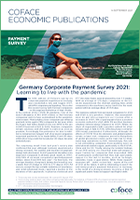Germany Corporate Payment Survey 2021: Learning to live with the pandemic

Paris, September 14, 2021–The 5th edition of Coface’s survey on corporate payment experience in Germany was conducted in July and August 2021, with 819 companies participating.
One of the main takeaways is that German companies seem to have acclimatised to the pandemic environment. More companies are offering payment terms compared to last year when the figure had fallen sharply. Although, Germany experienced a strong recession in 2020 and early 2021, payment discipline continued to improve in 2021 compared to already good results in 2020. Furthermore, the average duration of payment delays shortened by over a week.
The business outlook from surveyed companies is very positive. However, this assessment must be put into perspective as it comes after a recession in 2020. 41% of participants have a positive economic outlook for 2021. While the share of respondents with a positive outlook for 2022 remains high, it falls to 32%, reflecting lower certainty. Although the effects of COVID-19 remain a major risk, companies perceive disruptions of global production chains as the main risk for their exporting operations in 2021.
“The extremely good results regarding payment delays are slightly unnerving, bearing in mind that Germany has experienced its worst recession since 2008. However, we suspect that these favourable results were mostly thanks to government support. It will be interesting to see if companies can keep their heads above the water once they lose their financial lifejackets," commented Christiane von Berg, Northern Europe Economist at Coface.
Payment terms1: German companies got used to the pandemic
- According to the survey, German companies have been a bit more relaxed in 2021 and provided more payment terms to their customers. In 2020, companies were very cautious: the share of companies that offered payment credits dropped from over 80% in the pre COVID-19 period to 62%. This trend has reversed in 2021 as 74% of companies are offering payment terms. German companies operating on the domestic market are the main driver of this reversal: while only 57% of companies offered payment terms in 2020, this share increased to 73% in 2021.
- Short payment terms (between 0 to 60 days) still dominate the German business landscape. 88% of companies requested payments to be made within 60 days in 2021, which is almost unchanged from 2020 and 2019. The distribution of time-ranges for payment terms is also almost unchanged which explains why the average payment term in 2021 decreased only marginally from 33.5 days in 2020 to 32.6 days in 2021.
- Looking at sectors, construction still has the shortest payment terms: almost 75% of participants expect their invoices to be paid within the first 30 days with an average at 24.4 days. In 2021, 7 out of 11 sectors offered payment terms longer than 90 days, while ultra-long payment terms (above 120 days) have become very rare.
- Strong increases of average payment terms – of almost 10 days – were observed in the construction and the textile-clothing sectors. Conversely, machinery (-8.2 days), agri-food-wood (-7.3 days) and automotive (-6.3 days) reported the strongest declines in payment terms. Textile-clothing became the most generous sector and is now asking for payments to be settled up to 47 days after the delivery on average.
The answers in our survey hint that the uncertainty around the COVID-19 crisis has declined in 2021, but that companies remain vigilant. More companies are offering payment terms in Germany, but those have shortened slightly, suggesting that companies are still eager to cash-in as early as possible.
Payment Delays2: Companies get paid faster
- Since 2020, the number of payment delays decreased further. In 2021, only 59% of surveyed companies reported late payments, while 68% of all companies had reported delays in 2020. With the exception of transport and metals, the numbers of payment delays decreased in all sectors. However, while less than half of companies in the agri-food-wood sector reported late payments, the figure was at 70% in the textile-clothing sector.
- The Information-Communication Technology sector (ICT) shows the shortest time before payment. In this sector, the vast majority of surveyed companies reported delays no longer than 30 days and no company indicated delays above 60 days. In contrast, metals was the only sector to report delays over 150 days (2%). This is a significant improvement. In 2020, in addition to the metals sector, companies in construction and paper-packing also reported ultra-long payment delays.
- The average duration of payment delays decreased accordingly by 8 days to 27.7 days in 2021, which is the shortest average delay in our time series3 . Almost all sectors reported a decrease in the duration of payment delays. The strongest declines were in pharma-chemicals (-26 days) and ICT (-25 days). Companies operating in ICT have now the shortest waiting time with an average of 17.5 days, while companies in the machinery sector need the most patience with an average waiting time of 35.8 days.
- The reasons behind payment delays are mainly related to financial difficulties (46% in 2021). 20% of the opinions cited lower demand in Germany, primarily due to lockdowns. Interestingly, another 20% cited the lack of financing options, even though COVID-19 public financing support programmes are still in place.
- The financial risks associated with late payments for German companies are low in 2021. Only 4.4% of participants reported that the share of overdue payments between 6 months and 2 years represents 2% or more of their annual turnover.
Companies will weather the storm with the help of the state
- Companies’ assessment of the economic outlook is cautiously optimistic. 41% of participants have a positive economic outlook for 2021, while 11% think that their business situation will deteriorate compared to 2020. In total, the answers marks a sharp reversal from a very pessimistic year 2020. More optimism can be observed in all sectors, with the biggest rebound in the metals and automotive sectors. The outlook for 2022 is also positive, but seems less certain. The textile-clothing sector is the most optimistic for 2022 with +47 balance points. However, this sharp improvement in sentiment should be put in perspective with the very difficult situation in 2020 and 2021 for this sector in particular. The same is true for the automotive sector, where the positive outlook is rebounding after falling in the doldrums in 2020.
- According to the survey, the main risk for export operations in 2021 is by far disruptions of global production chains, which was cited by 40% of participants. Rising non-oil commodity prices is also a big topic in 2021 (20%), followed by the effects of COVID-19 on the global economy (10%) and on the German economy (8%).
- Germany remains the country presenting the biggest opportunities for surveyed companies. Its importance has however decreased from 91% in 2020 to 85% in 2021. One reason could be that in uncertain times, companies tend to do business in the countries that they know best and orient themselves more towards their domestic market (safe-haven effect). Now that the uncertainties have decreased, companies are again doing more business abroad.
- Difficult times call for special measures. When asked if they used State aid in the last 12 months, the share of companies that answered positively in 2021 was unchanged at 48%. The breakdown of support measures was also relatively unchanged with the most popular measure remaining the furlough scheme.
According to current law, emergency aid from the federal government and tax relief measures will expire at the end of September 2021, while special furlough programmes, state guarantees and special KfW-loan programmes will expire at the end of 2021.It will be interesting to see if the very positive payment behaviour and the optimistic business outlook can continue in 2022 without the State’s support.
Find the full study here
_____________________________
[1] Payment delays – the period between the due date of payment and the date the payment is made.
[2] The first Coface Corporate Payment Survey for Germany was published in 2016.
[1] Payment term – the time-frame between when a customer purchases a product or service and when payment is due.



